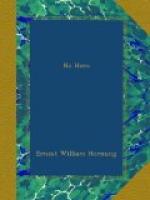“I’m glad you carry the outward signs,” said he, “for I made the most of your wounds and you really owe your room to them. You see, we’re a very representative crowd. That festive old boy, strutting up and down with his cigar, in the Panama hat, is really best known in the black cap: it’s old Sankey, the hanging judge. The big man with his back turned you will know in a moment when he looks this way: it’s our celebrated friend Belgrave Teale. He comes down in one or other of his parts every day: to-day it’s the genial squire, yesterday it was the haw-haw officer of the Crimean school. But a real live officer from the Front we don’t happen to have had, much less a wounded one, and you limp straight into the breach.”
I should have resented these pleasantries from an ordinary stranger, but this libertine might be held to have earned his charter, and moreover I had further use for him. We were loitering on the steps between the glass veranda and the terrace at the back of the hotel. The little sunlit stage was full of vivid, trivial, transitory life, it seemed as a foil to the vast eternal scene. The hanging judge still strutted with his cigar, peering jocosely from under the broad brim of his Panama; the great actor still posed aloof, the human Matterhorn of the group. I descried no showy woman with a tall youth dancing attendance; among the brick-red English faces there was not one that bore the least resemblance to the latest photograph of Bob Evers.
A little consideration suggested my first move.
“I think I saw a visitors’ book in the hall,” I said. “I may as well stick down my name.”
But before doing so I ran my eye up and down the pages inscribed by those who had arrived that month.
“See anybody you know?” inquired Quinby, who hovered obligingly at my elbow. It was really necessary to be as disingenuous as possible, more especially with a person whose own conversation was evidently quite unguarded.
“Yes, by Jove I do! Robin Evers, of all people!”
“Do you know him?”
The question came pretty quickly. I was sorry I had said so much.
“Well, I once knew a small boy of that name; but then they are not a small clan.”
“His mother’s the Honourable,” said Quinby, with studious unconcern, yet I fancied with increased interest in me.
“I used to see something of them both,” I deliberately admitted, “when the lad was little. How has he turned out?”
Quinby gave his peculiar nasal laugh.
“A nice youth,” said he. “A very nice youth!”
“Do you mean nice or nasty?” I asked, inclined to bridle at his tone.
“Oh, anything but nasty,” said Quinby. “Only—well—perhaps a bit rapid for his years!”
I stooped and put my name in the book before making any further remark. Then I handed Quinby my cigarette-case, and we sat down on the nearest lounge.
“Rapid, is he?” said I. “That’s quite interesting. And how does it take him?”




